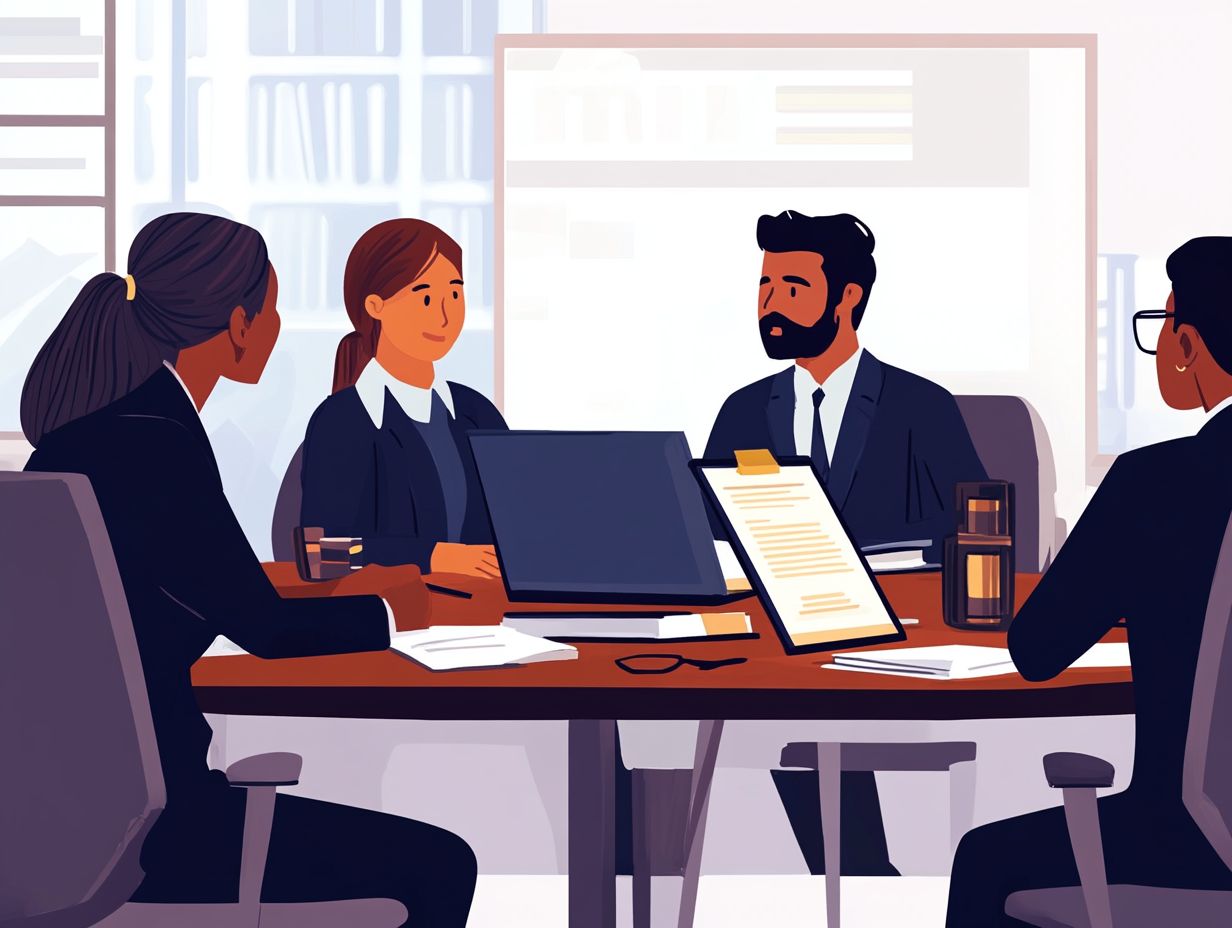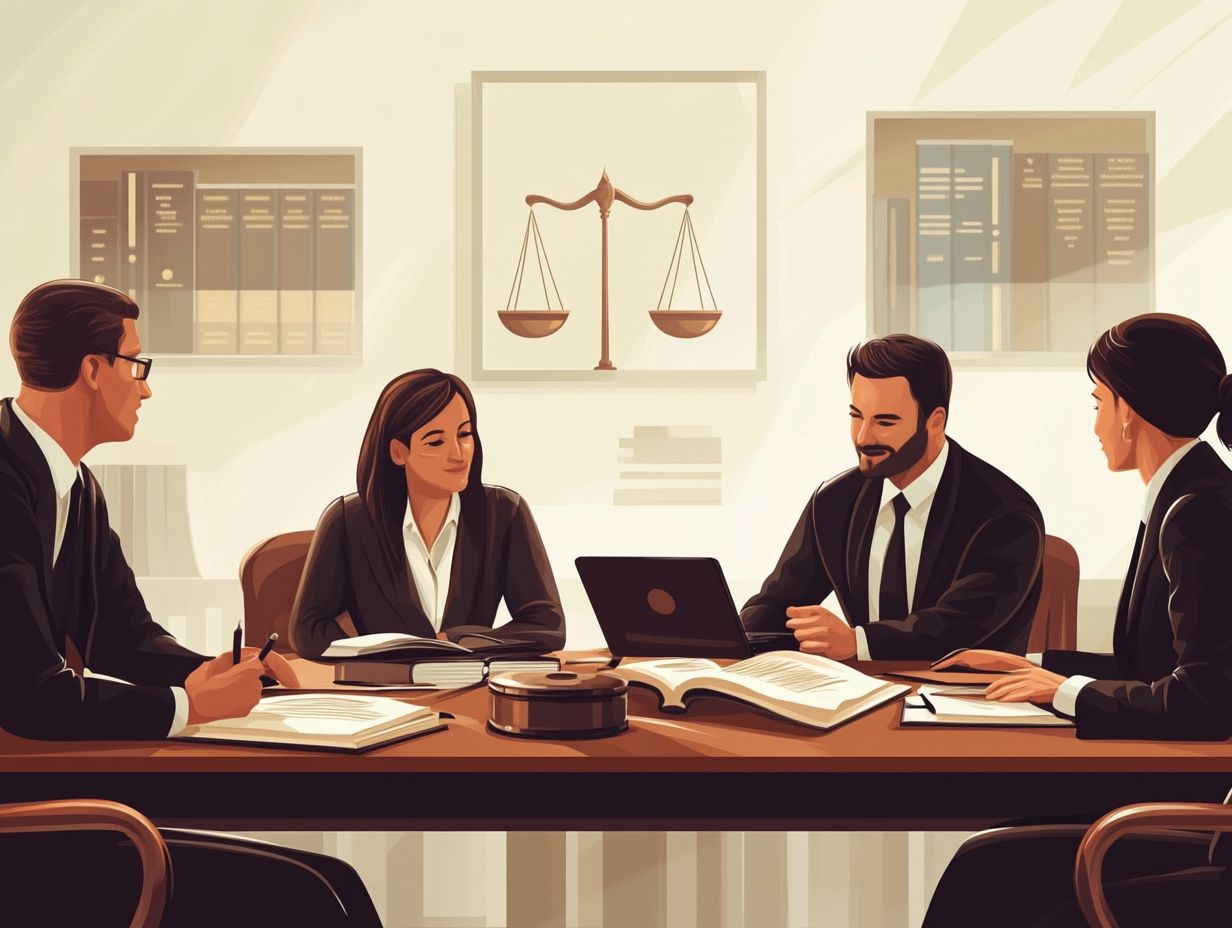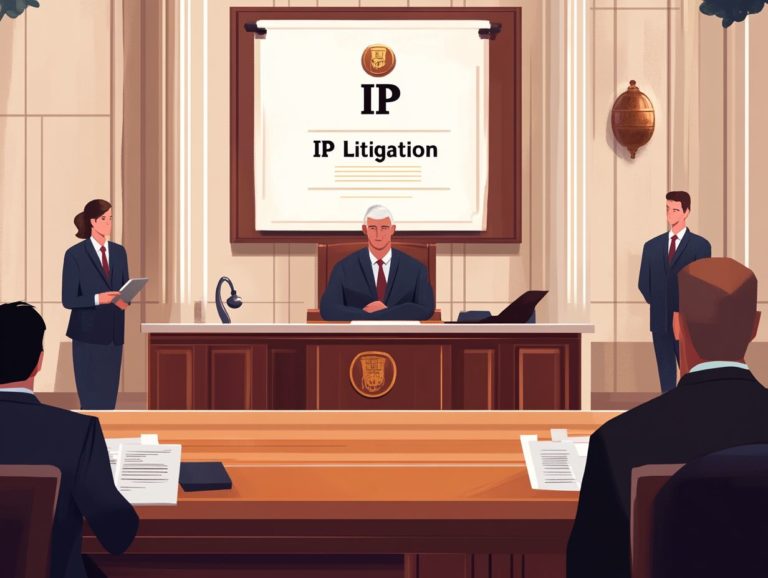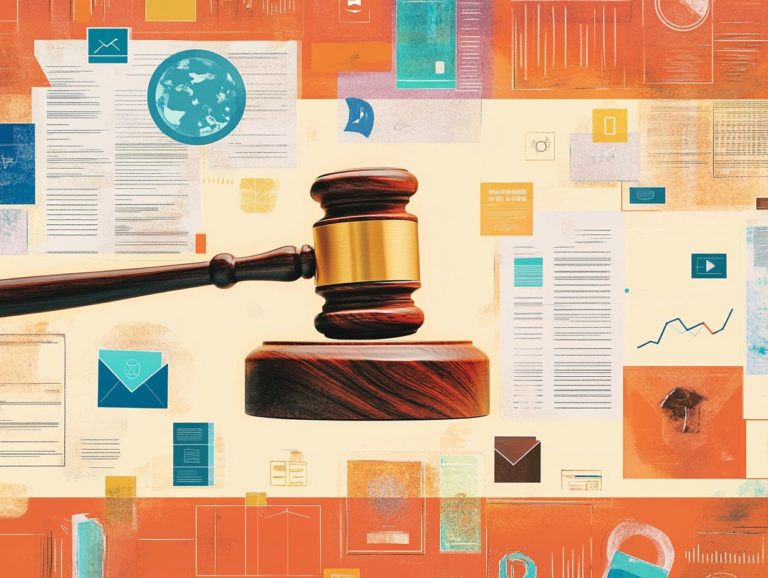5 Key Skills for Aspiring IP Litigation Lawyers
In the dynamic realm of intellectual property (IP) law, you ll encounter a complex landscape filled with unique challenges and opportunities as an aspiring litigation lawyer.
Get ready to discover five key skills that will set you apart in IP law! From mastering the intricacies of IP law to sharpening your analytical and communication abilities, each skill is vital for navigating litigation successfully.
You ll also explore the nuances of IP litigation, its significance, and how to prepare for a thriving career in this crucial area of law.
Don t wait! Equip yourself with the knowledge and tools necessary to excel as an IP litigation lawyer!
Contents
- Key Takeaways:
- 1. In-Depth Knowledge of Intellectual Property Law
- 2. Strong Analytical and Research Skills
- 3. Excellent Communication and Writing Abilities
- 4. Negotiation and Conflict Resolution Skills
- 5. Attention to Detail and Time Management Abilities
- What Is IP Litigation and Why Is It Important?
- Preguntas Frecuentes
- 1. Cu les son las 5 habilidades clave que deben poseer los abogados en litigios de propiedad intelectual?
- 2. Qu tan importantes son las fuertes habilidades anal ticas en la pr ctica de litigios de propiedad intelectual?
- 3. Qu papel juega la atenci n al detalle en el trabajo de los abogados en litigios de propiedad intelectual?
- 4. Por qu es la comunicaci n efectiva una habilidad clave para los aspirantes a abogados en litigios de propiedad intelectual?
- 5. C mo beneficia el pensamiento estrat gico a los aspirantes a abogados en litigios de propiedad intelectual?
- 6. Por qu es la adaptabilidad una habilidad necesaria para los aspirantes a abogados en litigios de propiedad intelectual?
Key Takeaways:

1. Develop a comprehensive understanding of intellectual property law to effectively navigate IP litigation challenges cases.
2. Strong analytical and research skills are essential for conducting thorough investigations and building successful legal strategies.
3. Effective communication and writing abilities are crucial for presenting complex legal arguments and negotiations in IP litigation.
1. In-Depth Knowledge of Intellectual Property Law
A comprehensive understanding of intellectual property law is essential for you as an aspiring IP lawyer, especially if you’re graduating from esteemed institutions like the UNH Franklin Pierce School of Law.
Here, you re not just learning the ropes; you re gaining valuable insights into the legal frameworks and strategies that govern IP rights, including patents, trademarks, and copyrights.
This deep understanding will enable you to provide effective legal representation while promoting innovation and economic development within the intellectual property landscape.
As you navigate the complexities of IP law, you ll play a pivotal role in shaping industry standards and protecting the innovative ideas that drive economic growth.
Earning a law degree from a respected institution not only prepares you for the bar exam but also immerses you in the intricate principles that underpin intellectual property rights.
Through rigorous coursework and hands-on experiences, you ll develop a keen understanding of how legal protections can drive creativity, safeguard against infringement, and ultimately enhance the marketplace.
In today s rapidly evolving economy, your proficiency as an IP lawyer will make you a vital advocate for innovation, ensuring that creators and businesses alike can thrive in a competitive environment.
2. Strong Analytical and Research Skills
Strong analytical and research skills are crucial for you as an IP lawyer, enabling you to adeptly navigate the complexities of patent applications and other legal processes tied to intellectual property law. To enhance your effectiveness, consider exploring 5 ways to strengthen your IP litigation team.
You need to cultivate a sharp sense of critical thinking, allowing you to dissect intricate legal issues and develop effective strategies.
Your problem-solving abilities will further enhance your capacity to manage disputes that involve complex case laws and evolving statutes.
Given the rapid pace of technological advancement, it’s essential for you to possess substantial technical expertise that complements your legal acumen.
Embracing continuous learning is vital. Staying updated with industry standards enables you to provide informed advice and effectively represent your clients interests in an ever-evolving landscape.
3. Excellent Communication and Writing Abilities
Excellent communication and writing skills are essential for you as an IP lawyer, enabling you to articulate complex legal strategies with clarity and build strong client relationships. To enhance your skills, consider exploring resources for IP litigation training.
These abilities not only facilitate successful negotiations but also enhance the drafting of critical legal documents, such as licensing agreements.
When you convey intricate terms in a straightforward manner, you foster a thorough understanding between parties, significantly reducing the likelihood of disputes.
Strong writing is also crucial for ensuring that all legal requirements are met, leaving no room for ambiguity.
Effective communication paves the way for deeper engagement with clients, allowing you to build trust and showcase your commitment to their success.
This relationship often extends to your professional associations, where clear dialogue enhances collaboration and learning among your peers.
4. Negotiation and Conflict Resolution Skills

Negotiation and conflict resolution skills are essential for you as an IP lawyer. These abilities enable you to advocate effectively for your clients while upholding legal ethics and navigating the complexities of the legal process, including avoiding pitfalls in IP litigation.
These skills are not just useful for securing favorable outcomes in licensing agreements; they are also crucial when disputes arise during negotiations. For instance, your ability to craft win-win scenarios can lead to mutually beneficial licensing terms that safeguard intellectual property rights while nurturing positive business relationships.
By employing strategic conflict resolution techniques, you can maintain professional rapport. This ensures that all parties feel heard and valued.
Consider a notable example: an IP lawyer who successfully mediated an agreement between two technology companies over software licensing terms. This turned a potential conflict into a collaborative partnership. These successes not only delight clients but also highlight the vital role of negotiation skills in IP law.
5. Attention to Detail and Time Management Abilities
Attention to detail and adept time management are essential qualities for you as an IP lawyer. They guide you through the complex legal landscapes of patent, copyright, and trademark law, and can also help you explore ways to strengthen your IP case before litigation.
Your unwavering focus on detail significantly influences the success of patent applications. A single oversight can spiral into costly rejections or frustrating delays. You must carefully review legal standards to avoid mistakes that might jeopardize your clients’ innovations.
Equally critical is your ability to manage time effectively, as you often juggle multiple cases with varying deadlines. Prioritizing tasks while ensuring quality representation becomes essential.
Using project management tools and legal software can improve your time management skills. These tools help organize tasks and deadlines effectively, streamlining your workflow and ensuring that nothing slips through the cracks.
What Is IP Litigation and Why Is It Important?
IP litigation encompasses the legal processes required to resolve disputes over intellectual property rights. It plays a pivotal role in the legal landscape, safeguarding innovative ideas and creative works against infringement.
You ll find that various forms of IP litigation cover issues such as patent infringement, where unauthorized use of a patented invention can stifle advancements, and trademark disputes, which can jeopardize brand identity and consumer trust.
For IP lawyers and their clients, understanding the intricacies of these litigations is essential. This knowledge directly impacts their capability to protect valuable assets.
Consider this: businesses entangled in patent litigation typically spend an average of $1.5 million on legal fees. This highlights the significant financial implications of such disputes. Fortunately, favorable resolutions not only protect intellectual property but also pave the way for increased investment in research and development, thereby propelling economic progress.
What Are the Different Types of Intellectual Property?
Let s explore the crucial types of intellectual property that protect creativity and innovation. There are several distinct types, including patents, copyrights, trademarks, and trade secrets, each serving specific purposes in safeguarding various forms of creative works and innovations.
Patents protect new inventions, granting exclusive rights for a specified period to foster innovation. Copyrights shield original artistic expressions whether it s music, literature, or visual art ensuring that creators receive both recognition and compensation for their work.
Trademarks play a very important role in identifying and distinguishing products or services in the marketplace, enabling consumers to make informed choices. Meanwhile, trade secrets encompass confidential business information that provides a distinct competitive edge.
By mastering how these protections operate, you enable yourself as a creator or entrepreneur, maximizing your intellectual assets while navigating the complexities of legal landscapes with confidence.
How Can One Develop Their Knowledge of Intellectual Property (IP) Law?

Developing a comprehensive understanding of IP law requires a commitment to legal education and continuous learning. Actively seeking mentorship opportunities within the legal community can also be beneficial.
To start, explore various pathways like enrolling in specialized law school courses focused on intellectual property. Participating in workshops and webinars offered by legal institutions grants you practical insights from industry leaders.
Joining professional associations dedicated to IP law equips you with valuable resources and opens networking opportunities with peers and experienced professionals.
A great mentor can guide you through the complexities of IP law and share real-world experiences, making your learning journey invaluable.
Stay updated through ongoing education to remain attuned to the latest trends and developments in this ever-evolving area of law.
What Are the Common Challenges Faced by IP Litigation Lawyers?
IP litigation lawyers face many challenges, such as navigating complex legal ethics and addressing the diverse needs of clients in a fast-paced legal environment.
One major hurdle is the details of case law, which can vary significantly across jurisdictions. For instance, you may find yourself deep in a copyright infringement case where precedents contradict each other, requiring you to balance outdated rulings with current interpretations.
While striving to meet client demands, it s crucial to remain aware of ethical boundaries, especially when representing clients whose interests might conflict with industry standards.
The rapid pace of technological advancements complicates your role; you must continuously adapt to new tools and methods while ensuring that your strategies protect client interests and adhere to ethical guidelines.
What Are the Necessary Steps to Prepare for IP Litigation?
Preparing for IP litigation involves several critical steps, including gathering technical expertise and thoroughly understanding the legal process. Additionally, reviewing the lessons learned from major IP litigation cases can provide valuable insights, making it essential to secure strong legal representation for your clients.
To begin, conduct comprehensive research on relevant patents, trademarks, or copyrights. This lays the groundwork for a solid case. Drafting precise legal documents, such as complaints and responses, will help outline your legal arguments effectively.
Strategizing with your clients is vital. This collaborative effort ensures that their objectives align with your chosen litigation approach. Throughout this process, teamwork among legal professionals becomes essential; sharing insights and expertise enhances your overall strategy and increases the likelihood of achieving a favorable outcome.
How Can One Stand Out as an IP Litigation Lawyer?
To stand out as an IP litigation lawyer, cultivate a competitive edge through specialized legal education, active involvement in professional associations, and by applying 5 key strategies for successful IP litigation to continuously enhance your skills.
Pursuing advanced degrees in intellectual property law or closely related fields can deepen your understanding of complex legal nuances, ultimately refining your case strategies.
Building a robust network of industry contacts at networking events opens doors to potential clients and fosters invaluable collaborations.
Engaging in pro bono work showcases your commitment to the profession and the community, significantly boosting your reputation. Moreover, maintaining strong client relationships through frequent communication and personalized service can lead to repeat business and referrals, reflecting your dedication to excellence in representation.
Preguntas Frecuentes

1. Cu les son las 5 habilidades clave que deben poseer los abogados en litigios de propiedad intelectual?
Las 5 habilidades clave son: fuertes habilidades anal ticas, atenci n al detalle, comunicaci n efectiva, pensamiento estrat gico y adaptabilidad.
2. Qu tan importantes son las fuertes habilidades anal ticas en la pr ctica de litigios de propiedad intelectual?
Las fuertes habilidades anal ticas son cruciales en litigios de propiedad intelectual. Los abogados deben desglosar complicaciones legales, identificar informaci n relevante y crear argumentos s lidos.
3. Qu papel juega la atenci n al detalle en el trabajo de los abogados en litigios de propiedad intelectual?
La atenci n al detalle es esencial para los abogados en litigios de propiedad intelectual. Deben revisar grandes vol menes de documentos legales y evidencia para construir un caso s lido.
4. Por qu es la comunicaci n efectiva una habilidad clave para los aspirantes a abogados en litigios de propiedad intelectual?
La comunicaci n efectiva puede ser la clave del xito en litigios. Los abogados deben presentar argumentos claros en la corte y negociar con partes opuestas.
5. C mo beneficia el pensamiento estrat gico a los aspirantes a abogados en litigios de propiedad intelectual?
El pensamiento estrat gico ayuda a anticipar problemas legales. Los abogados desarrollan estrategias s lidas y encuentran soluciones creativas para conflictos complejos.
6. Por qu es la adaptabilidad una habilidad necesaria para los aspirantes a abogados en litigios de propiedad intelectual?
La adaptabilidad es vital en un panorama legal en constante cambio. Los abogados deben ajustarse a nuevas leyes y tecnolog as para representar efectivamente a sus clientes.






